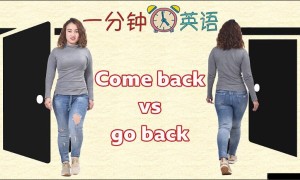规则一:否定副词放句首
当具有「限制 (restrictive)」或「否定 (negative)」意义的副词出现在句首时,需使用倒装句型!
事实上,将否定副词放在前面,是有强调作用的意味。
常见的否定用语包括:
1. 绝不:never、by no means、under no circumstances、on no account、in no way、at no time
By no means will I give up my dream. 我绝不会放弃梦想。

2. 几乎不:seldom、little、rarely、hardly、scarcely
要注意的是,当以“hardly” 或 “scarcely”作开头时,会是以下的句式:
“hardly/scarcely had…before/when…”
Scarcely had I left home when/before it started to rain. 我刚出门就下雨。
(=I had scarcely left home when/before it started to rain.)
也可写成另外一种很简单的写法:It started to rain just after I left home.
3. 直到…才…:not until
Not until then did my parents allow me to drive the car. 在那之前,我父母不准许我开车
(=My parents did not allow me to drive the care until then.)
4. 再也不:no longer
No longer does he need my help. 他再也不需要我的帮忙。
5. 一…就…:no sooner …than…
No sooner had I put the phone down than it rang again. 我一放下电话,电话又再度响起。
注意:no sooner 后须搭配「先发生的动作—放下电话」,用过去式「had + p.p.」表示且倒装,而后「发生的动作- 电话响」 用「过去式」表示,且不需倒装。
6. 不只…而且…:not only + 句子1 , but also + 句子2;句子1需倒装。 →点击看影片用法
Not only did he make a promise, but he also kept it. 他不止作出承诺,也遵守了。
(=He not only made a promise but he also kept it.)
* 补充 “only”
副词 “only” 所强调的方式状态语、条件状态语、地点状态语、时间状态语等位于句首时,会有部分倒装。
only by taking a taxi can you arrive there on time. 你只有搭计程车,才可能准时抵达。
注意:如果only修饰的不是状态语而是主语,则不能倒装。
only his mother was invited. 只有他妈妈受到邀请。
规则二:neither、nor、so 之后
聊天时,用 “So did I.” 这样的话,表达同意对方,这用法对大家来说应该不陌生吧?
你甚至可能因为太习惯这样的用法,而忽略了它倒装的原因。
nor
“nor” 是 “or” 的否定用法, 有「也不;也没有」的意思。
The mayor of Toronto refused to resign, nor do we expect him to. →点击看影片用法
so
用 so 表示「我也这样」的概念时,常用以下结构:
肯定:so + be/ have/ 助动词/ 情态动词 + 主语
否定:nor/ neither + be/ have/ 助动词/ 情态动词 + 主语
He has visited the museum. -So have I.
他已经参观了博物馆,-我也参观了。
She can swim. -So can I.
她会游泳。 -我也会。
The boy can’t skate. -Nor can his brother. (Neither can his brother.)
那男孩不会滑冰。 -他的兄弟也不会。
这里有个重点!当 so 的意思不是「我也…」,而是表示「的确如此」,则绝对不能倒装。
John won first prize in the contest. -So he did.
约翰在比赛中赢得一等奖。 -的确如此。
规则三:条件句 (should、had)
以 “should” 或 “had” 开头的条件句,是较为正式的用法。如影片中提及的,在书写较为正式文章可以使用。
Should you need any help, don’t hesitate to call. 如果你需要任何帮助,别迟疑打来吧! →点击看影片用法
“should” 在这里其实就是 “if” 的意思,而语气上比 “if“ 更为正式。
Had I known you were coming, I would have changed. 如果我知道你会来,我就会换套衣服了。







